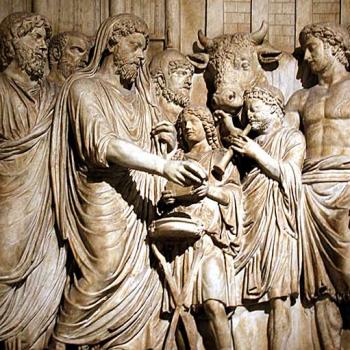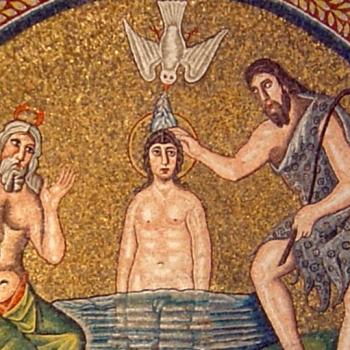This guest post is by Robyn Shepherd.

In his post on this blog yesterday, “Indeed Very Many: Universalism in the Early Church,” Matthew Distafano cites an impressive list of Early Church Fathers who were pro-universal salvation, and connects the switch in Christian theology to exclusivism with the writings of Augustine (in the late fourth and early fifth centuries), the Emperor Justinian, and the Fifth Ecumenical Council in Constantinople in the sixth century.
As a student of Patristics, I find this timing significant. Almost anyone who has studied the history of the Christian faith knows the name of Constantine as the emperor who made Christianity the religion of the Roman Empire. Many now mournfully mark this event as a defining moment in the established Church’s abandonment of the teachings of Jesus. For those who led the churches at the time, it seemed a godsend.
However one understands the theological significance of the event, the joining of the Christian faith (and its organized expression) to the ruling powers of the Roman Empire established the Christian Church as a significant cultural institution for the first time. This institution was, in turn, used by the powers that be to control the lives and beliefs of the peoples of the empire. This is where the drive to identify the “orthodox” version of Christian faith over against the “heretical” versions gathered its momentum.
In the fourth century, the debates centered around the divinity of Jesus and eventually led to the formation of the doctrine of the Trinity. In the fifth century, the debate centered around the relationship between the two natures of Christ (divine and human). These debates took decades to brew and develop as bishops and theologians wrote letters and theses, contradicted and debated with one another, lobbied secular authorities for support, and played politics in an attempt to “win” the debate and get their understanding enshrined in the annals of an ecumenical council.
When I read Distafano’s article, I saw a continuity I had not before noticed. As the Roman Empire crumbled, the Roman Catholic Church, particularly in western Europe, became the most significant international power. The Roman pontiffs were, quite literally, kingmakers. What better to cement the Church’s power and authority than the enshrinement and propagation of the doctrine of limited atonement, together with the assurance that the Church holds the keys to eternal salvation?
The process of codification and exclusion that begins with Constantine seems, on reflection, to lead quite naturally to the discarding of the ideal of universal salvation in favor of exclusivist truth claims that give the Church the ultimate power over heaven and hell and, with that power, the ability to intimidate, control, and exploit everyone from kings to serfs.
What a terrifying thought. Does the punitive theology of the afterlife actually exist because the institutional church could not sate its thirst for power?
Of course, the whys and wherefores, the causes and influences that shape church doctrine are many and complex, but if it is true that the vast majority of pre-Constantinian thinkers were open to, if not exponents of, the idea that all might eventually be “saved,” then the post-Constantinian trend towards greater control of the lives of individual people seems clear to me.
What would it mean for Christians and churches today to realize that the message of Jesus has nothing to do with saving people from hell? What would Christianity be, if it wasn’t about “getting saved” and “going to heaven when you die”? What would “church” look like if there was no need to codify or control correct doctrine, because no one’s “eternal soul” actually depends on it?
Would there be any need for an institution of church to exist at all?
Photo via Unsplash.
About Robyn Shepherd
Robyn Shepherd lives with her husband and son in beautiful Mid-Wales. After a lifetime in church and more than a decade studying theology, she now invests her time in writing, homemaking and community building. She blogs at rsshepherd.wordpress.com.












